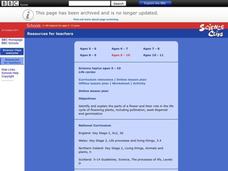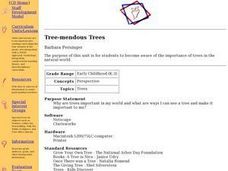Curated OER
No Title
First graders listen as the book, "Tops and Bottoms," by Janet Stevens is read to them and then participate in a discussion about foods and where they grow. They draw a picture of a plant labeling the major parts of it sequential order.
Curated OER
Growing and Harvesting Fruits and Vegetables
Students learn the various parts of a farm and what is grown on a farm. They also match fruits and vegetables to locations where they are grown.
Curated OER
Pollination Power
Second graders study and examine the structure of a flower. In this pollination lesson, 2nd graders observe pollinators in the garden and dissect a flower. Students then plant strawberry plants in the garden and observe the process...
Roald Dahl
The Twits - The House, the Tree and the Monkey Cage
A house with no windows and a garden full of stinging nettles make the perfect home for Mr. and Mrs. Twit. The seventh lesson in an 11-part unit designed to accompany The Twits by Roald Dahl takes a closer look at the Twits' home...
Curated OER
Our Friends or Foes
In this living organisms worksheet, 6th graders choose the multiple choice answer to 10 questions. Students then read and answer 10 statements as true or false and fill in the blanks to 5 statements.
Curated OER
Eggshell People
Students observe grass growth. In this agricultural lesson, students use empty eggshells and fill them with soil and grass seed. Students record eggshell "hair growth" on a chart.
Curated OER
Life Cycles
Learners identify and explain the parts of a flower and their role in the life cycle of flowering plants. In this online plant biology lesson, students explore the processes of pollination, seed dispersal, and germination. Extension...
Curated OER
Tree-mendous Trees
Young scholars become aware of the importance of trees in the natural world. Students are shown 2 filmstrips - Special Things About Trees and Tree Magic. Young scholars plants seeds. They, students predict the growing chart of tree...
Curated OER
It Ain't Easy Being Green!
Students explore the needs of plants. In this science lesson, students plant seeds and place one in a sunny spot and the other in a dark area. Students observe what happens.
Curated OER
A Garden in the Mailbox
Students study seed catalogs to find information about plants and growing seasons. They write letters requesting a seed catalog after using online resources. They use them complete an associated worksheet and discuss zone maps for their...
Curated OER
Plant Growth
Students explore the parts of a plant and seed. They plant seeds and observe the growth of plants. Students record the observations. They discuss and share the observations they see.
Curated OER
Plants
Students identify and label parts of a plant. They will construct a plant from art material and describe the purpose of each part for the plants survival. Students author a book with pictures and words or a story about a plant.
Curated OER
Glossaries
Explore text structure with a focus on the glossary feature in informational texts. Learners read a brief introduction before examining a glossary from a text about plants. They reference it while completing four comprehension questions....
Curated OER
It's Just Dirt
Students discover how seed germination varies according to the soil type. In this soil science instructional activity, students discuss what plants need in order to grow and investigate various types of soil. Students use their senses to...
National Christmas Tree Association
Merry Christmas, Geraldine
If you're reading the story "Merry Christmas, Geraldine" by Holly Keller, this is a fantastic cross-curricular resource to use. Complete with activities for language arts, science, social studies, art, and math, you'll get the most out...
Curated OER
The Living Environment
In this living environment worksheet, students complete a crossword puzzle given 34 clues about the various species in the environment that produce, consume and decompose. Topics also include photosynthesis, respiration, glucose, organic...
New South Wales Department of Education
Plant Groups
Bryophytes can grow in temperatures just above zero degrees. This 17th installment in a series of 20 introduces learners to the five groups of plants: algae, bryophytes, pteridophytes, gymnosperms, and angiosperms. Classes then explore...
Curated OER
Pumpkin Time
Students visit a pumpkin farm and discuss the characteristics of a pumpkin and how they grow. They create a class story about the trip to the farm with each student supplying a sequence for the story.
Cornell University
Sun or Water? or Both?
Over the course of 10 days, young scientists observe their cups of seed and soil—one that gets sun and water and one that gets no sun and only water. Then they reflect on the results of the experiment to determine if their hypothesis was...
Desert Discovery
Life Cycle of the Saguaro
Third graders make books which illustrate the growth and development of a saguaro cactus from its beginnings as a seed all the way through its death. They trace the life cycle of the saguaro, identify each of the stages in its life,...
Virginia Department of Education
Weather Patterns and Seasonal Changes
Get your class outside to observe their surroundings with a lesson highlighting weather patterns and seasonal changes. First, learners take a weather walk to survey how the weather affects animals, people, plants, and trees during...
Curated OER
Recyclers to the Rescue
Producers, consumers, food chains, and plants are the stars of this science lesson. Learners take part in an inquiry which helps them to discover the most effective and efficient way to grow a producer. They have a variety of containers...
Curated OER
You Can Depend On me
Discover the natural beauty of California. With a conservation bent, this activity delves into some of the attributes that make this state unique. Learners discuss Yosemite and the forest habitat. They focus on the things plants and...
The Science Spot
Flower Basics
Learn about plants and pollination with a worksheet about the parts of a flower. After labeling the anatomy of a flower using a word bank, kids explain the difference between self-pollination and cross-pollination, and unscramble...

























